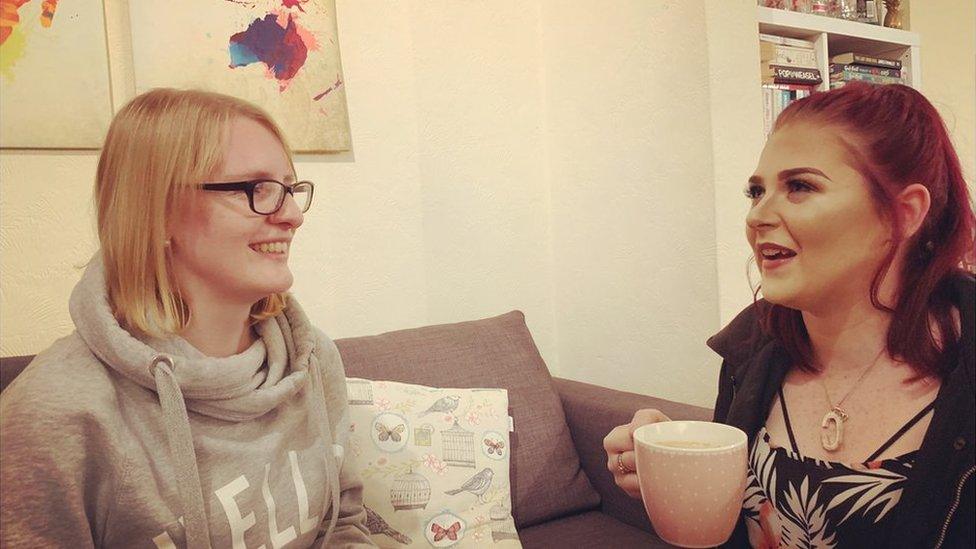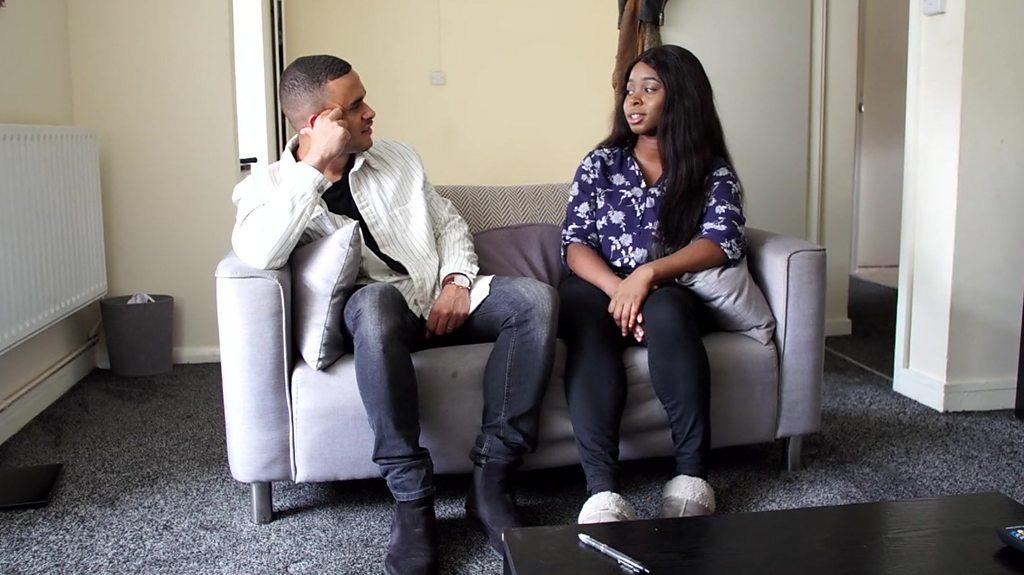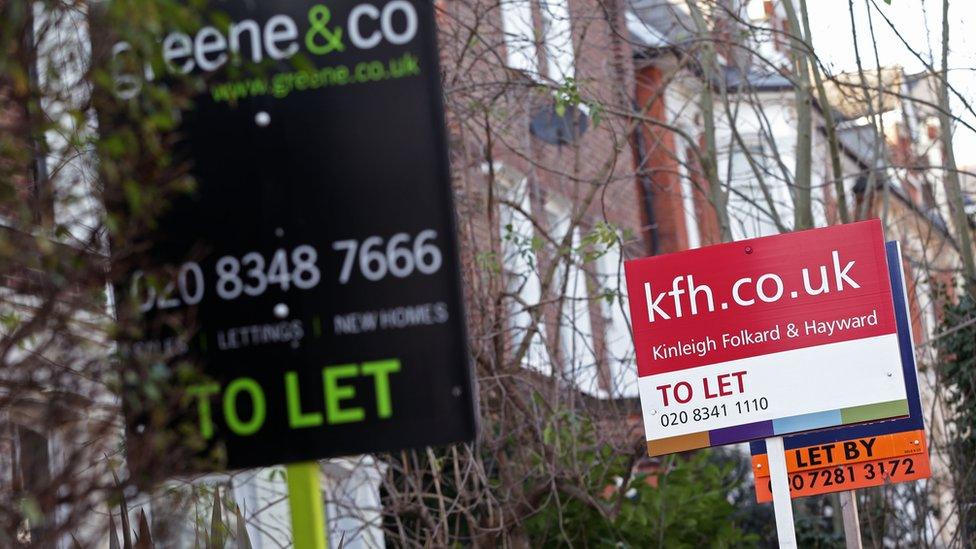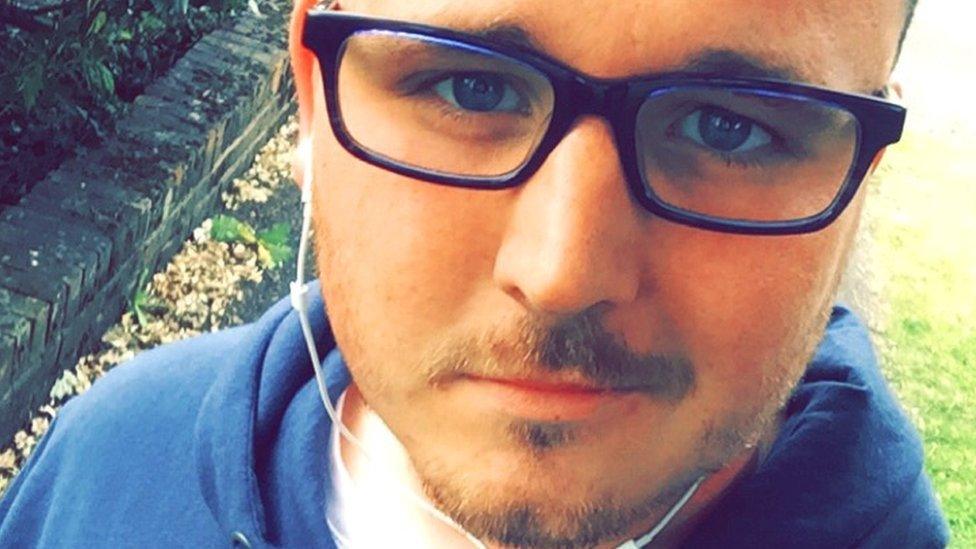Leaving care: 'A spare room changed my life'
- Published

Chloe (r) had more than 30 foster placements before she moved in with Sarah Chapman (l)
Leaving care can feel like facing a cliff edge and it is not only care leavers who say this, it is government ministers. They are launching a landmark scheme to ease the path to adulthood for some of England's most vulnerable teenagers.
More than 50 organisations, including government departments and industry giants like Rolls-Royce, have signed up to the government's Care Leaver Covenant, external, which will provide 10,000 work opportunities to care leavers over 10 years.
They aim to help people like Chloe, who was in foster care from the age of 13, and now, at 18, holds down a steady job in the hospitality industry.
"When I tell people about my previous life you can see their jaws drop," she says.
"I thought I would end up as a drug addict and I just accepted it. It was all I thought my life would amount to."
Chloe says she had more than 30 placements in three years. She ran away frequently and "spent a lot of time in police stations, waiting to be picked up again".
She says the right support at the right time has helped her on "a massive journey".
"I've grown up so much in the past year."
Moving on
At 17, as the end of her time in care approached, Chloe feared she might end up in a hostel - but her social worker suggested trying supported lodgings through the charity Barnardo's,, external where people offer a spare room to a vulnerable young person and help them on the path to independent living.
The person with the spare room was Sarah Chapman, a lawyer in her early 30s, from Warwickshire.
She already volunteered with Barnardo's and with the Girl Guides, so, when she heard about supported lodgings, she knew she was well placed to help.
"I enjoy working with that age group. So I thought it was a good opportunity to put my spare room to better use than just a regular lodger, and maybe help out a teenager who needed support at a quite a critical time in their life," says Sarah.
Background checks, training and reassurances about ongoing support followed.
Sarah was approved as a host and then the charity began sending potential lodgers round to meet her.
"It was a little bit nerve-wracking but, you know, part of the process, and it was a really good part, to make sure you're matching people with the right provider."
Chloe was the second girl to come round and the pair "clicked".
"We were very comfortable in each other's company and the conversation flowed easily. So we all agreed that she could move in."

A year on, Sarah says: "It's been excellent."
She likes having company around the house and is impressed by how Chloe has "straightened herself out".
Chloe says starting work was key to her transformation.
She eventually hopes to move into management or run her own business.
"I like having a job. I like being busy. I don't like sitting down doing nothing."
But before she moved in with Sarah it was difficult to hold down a job because she was constantly moving home.
Now she has "somewhere I know I'm going to be able to go back to".
"It's not like I'm going to get there and my social worker will be outside in a car with all my stuff in the back telling me I'm moving."
At Sarah's she is learning to cook and eat more healthily, to shop and budget for herself and even to save out of her wages.
Sarah says there have been "a few ups and downs... but mainly things you get living with any teenager".
"They're not keen on washing up or cleaning or taking the bins out, but I don't think that's a symptom of coming out of the care system, I think it's a symptom of being a teenager."

Chloe admits that, initially, she had low expectations of sharing Sarah's home.
"I'd learnt the hard way not to get too excited or attached because I'd been passed around so many places.
"But this was different. Sarah let me put up posters, pictures and mirrors, and we went out shopping together to get lamps, shelves and duvets.
"For the first time I started to feel pretty good about myself."
Unlike care leavers who go straight into independent living, there's no danger of the electricity being cut off because she has run out of money and there's always enough to eat.
She says she would advise any other young person offered the chance of supported lodgings to "go for it".
Under the supported lodgings arrangements, Chloe is eligible to stay at Sarah's until she is 21 and ready to be properly independent.
"It's Sarah's home but now it feels like my home too," says Chloe.
"I always tell her where I'm going and what I'm doing, but it's not like she's pretending to be my mum.
"We've grown very close and we have very long talks about all sorts of things, from mundane stuff to relationships. I know that I can talk to her about anything."
Sarah agrees that substitute parents are "often the last thing these teenagers need".
"They're looking for an older sister, an aunt, a mentor, supportive but not mollycoddling or trying to do everything for them.
"This is the point at which they're trying to learn how to be independent."
- Published25 September 2018

- Published29 March 2018

- Published3 April 2017

- Published15 February 2017
